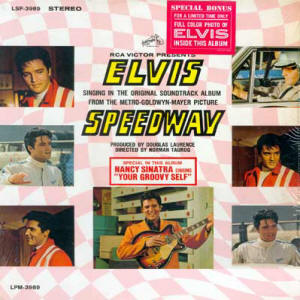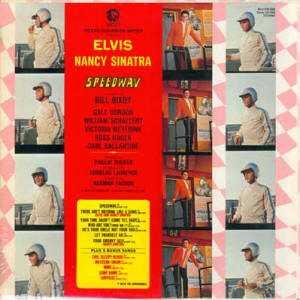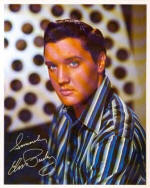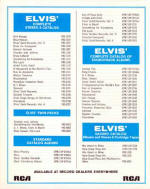

In May 1968, a month before MGM started
"Speedway",
RCA Victor released the accordant soundtrack
album. It entered Billboard's "Top LPs Chart" on
July 6th, had a run of 13 weeks and peaked at
number 82. Worldwide the album sold a million
units, which translates to 150 million paid
streams of the complete record or 1.5 billion
paid streams of individual tracks. Thereby
"Speedway" replaced "Double Trouble" as the
king's worst selling album.
In 2016 the complete Presley catalogue was
restored and remastered by Vic Anesini for a
boxed set of 60 compact discs called "The Album
Collection". Sony Music Entertainment provides
the streaming platforms with the same versions
of the individual albums (some of them offering
bonus tracks), albeit in 24 bit/90 khz flac.
That means, if the platform of your choice
supports high resolution audio, you can enjoy
the tracks in the same quality Sony used to scan
and master them. On Spotify, which has a market
share of approximately 30% and is the only
platform that publishes streaming figures,
"Speedway" accumulates 4 million
streams with 1,500 requests per day. Compared to
the past the album has gained some popularity.
The "Harum Scarum" soundtrack for example sold
2.5 times as many units as "Speedway", but the
digital version of the latter one was streamed
twice as much. However, even four million
streams mean nothing in today's world and so
this soundtrack is another example of music,
that doesn't work without the cross promotion of
the accordant movie.
The cover was designed with scenes from the
movie, the solo performance of Nacy Sinatra was
mentioned in big, red letters. The first edition
also included a special bonus photo.
Unfortunately it was an old one, made to promote
"Girls! Girls! Girls!" in 1962 and therefore
looking quite old fashioned in 1968.


The soundtrack was recorded on June 20th and
21st 1967 at the MGM Soundstage in
Hollywood/California. The sessions were produced
by Jeffrey Alexander and engineered by Lyle
Burbridge and Aaron Rochin. Elvis' band
consisted of Chip Young (guitar), Hilmer J.
Timbrell (guitar), Tommy tedesco (guitar, on
June 21st only), Murrey Harman (drums), D.J.
Fontana (drums), Larry Muhoberac (piano),
Charlie Hodge (piano on "Suppose"), Pete Drake
(steel guitar), Homer Randolph (saxophone) and
Charlie McCoy (trumpet). The harmony vocals were
provided by The Jordanaires (Gordon Stoker, Hoyt
Hawkins, Neal Matthews and Ray Walker). The vast
soundstage caused some hiss and echo, the
typical "soundtrack mix" didn't improve the
situation at all. Nacy Sinatra recorded "Your
Groovy Self" and her part of "There Ain't
Nothing Like A Song" on June 26, 1967 at United
Recorders in Hollywood/California. The session
was produced by Jeffrey Aleander and Lee
Hazelwood and engineered by Eddie Bracket. Billy
Strange was contracted as arranger and guitar
player. The other musicians were Donnie Lanier
(guitar), Donald Owens (guitar), Al Casey
(guitar), Chuck Berghofer (bass), Don Randi
(piano), Larry Knechtal (piano), Hal Blaine
(drums), Roy Caton (trumpet), Virgil Evans
(trumpet), Oliver Mitchell (trumpet) and Dick
Hyde (trombone). Because the soundtrack was too
short to fill an album, RCA Victor added five
bonus tracks. By doing so the long player was
brought to a running time of 28:26 minutes.
In 2016 Follow That Dream Records released a
collector's edition of "Speedway", which
includes outtakes and different mixes. For a
review just tap
HERE.
Speedway
The album starts with the title song of the
movie. It's a fast popsong, describing the
atmosphere of a car race. The tune by Melvin
Jacob Glazer and Stephen David Schlaks is not
bad, but also doesn't give a lasting impression.
Elvis recorded "Speedway" on June 20, 1967 and
needed 4 takes to get it right.
There Ain't Nothing Like A Song
Joy Byers and Bob Johnston had supplied the song
for "Spinout", but at the time the king had
rejected it. By now the quality of the songs was
obviously so low, that "There Ain't Nothing Like
A Song" suddenly became one of the best
suggestions. In the movie this tune is the
finale, I don't like this hectic song too well.
Elvis taped the track on June 20, 1967 within
six takes, Nacy Sinatra added her (few) lines
six days later.
Your Time Hasn't Come Yet, Baby
A little girl admires Steve (Elvis) and wants to
marry him. With this song he explains, that her
time for things like that hasn't come yet. The
lyrics are cute and the melody stays with you.
Originally the song was called "My Time Hasn't
Come Yet, Baby" and was supposed to be sung to a
somewhat older girl. But then the script was
changed and Joel Hirschhorn and Al Kasha turned
their tune into a children's song. Elvis
recorded it on June 20, 1967 within six takes.
In June 1968 RCA Victor released "Your Time
Hasn't Come Yet, Baby" on a single.
Who Are You (Who Am I)
This is a typical movie ballad, this time in
lounge music style. The bland song was written
by Sid Wayne and Ben Weisman and recorded by
Elvis on June 20, 1967. The 6th take was
selected for release. By the way: This is the
king's only ballad, that features a saxophone
solo.
He's Your Uncle, Not Your Dad
Because of their outrageous tax declaration
Steve (Elvis) and his manager Kenny (Bill Bixby)
are forced to visit the revenue office. While
they are waiting they perform this song. The
lyrics are an ironic ode to tax morality, the
melody is full of cliches of American
patriotism. The funny song was written by Sid
Wayne and Ben Weisman. On June 21, 1967 the king
needed seven takes to record "He's Your Uncle,
Not Your Dad".
Let Yourself Go
In unusual candor the singer asks the lady to
let herself go and succumb to him. The musical
level is also far above the standard movie
tunes, I'd even say "Let Yourself Go" could have
also been a candidate for a regular studio
album. RCA Victor put the track on the b-side of
"Your Time Hasn't Come Yet, Baby". Even though
it never made it past number 71 of Billboard's
"Hot 100", the king seemed to like the song and
re-recorded it for his television special
"SINGER presents Elvis" (1968).
Your Groovy Self
(performed by Nancy Sinatra)
Because of the declining sales Elvis and Colonel
Parker now accepted a solo performance by
another artist on a Presley album. "Your Groovy
Self" was written by Lee Hazlewood and even
though it's far from being a hit, it sounds much
more contemporary than the stuff Elvis'
publishers had to offer.
Five Sleepy Heads
(bonus song)Sid
Tepper and Roy C. Bennet based their song on the
"Wiegenlied" by Johannes Brahms. It was
written for a scene, in which Steve (Elvis) puts
five children to bed. Because MGM cut this
particular scene from the movie, RCA Victor
labeled the track as "bonus song". The king
recorded "Five Sleepy Heads" on June 20, 1967
within three takes.
Western Union
(bonus song)Now the
sound quality improves, because this and the
following tracks were recorded at RCA
Studio B in Nashville/Tennessee. "Western Union"
was a leftover from May 27, 1963, when Elvis
taped the song by Sid Tepper and Roy C. Bennett
within four takes. The tune is reminiscent of
"Return To Sender". Once again the singer had a
quarrel with his girlfriend and apologizes with
a written note - this time transferred by
Western Union.
Mine
(bonus song)
This ballad was also written by Tepper/Bennett,
this time for the movie "Paradise, Hawaiian
Style". At the time it was rejected (even though
"Mine" had been the highlight of the
soundtrack), but Elvis recorded it on September
10, 1967 at RCA Studio B in Nashville/Tennessee.
Because no satisfactory performance emerged, the
king's vocals were removed from the 21st take
and Elvis re-recorded his part later. "Mine" is
a beautiful song, that easily could have been
used on a regular studio album, too.
Goin' Home
(bonus song)
The same applies here, even though Elvis himself
didn't like the song. It was recorded at RCA
Studio B in Nashville/Tennessee for the movie
"Stay Away, Joe" on January 15, 1968. Maybe
because of his dislike for the tune the king
needed 30 takes to get it right.
Suppose
(bonus song)
The album ends with this beautiful ballad by
Silvia Dee and George Goehring. Originally Elvis
had taped the song at home and given the
recording to Felton Jarvis for post-production.
But then he decided to re-record "Suppose" in a
professional environment and recorded seven
takes of this love song on June 20, 1967 at the
MGM Soundstage in Hollywood/California.
Verdict
Compared to movie albums like "Harum
Scarum" (1965) or "Double Trouble" (1967)
this one is a tad better. The main reasons
are "Let Yourself Go" and the many bonus
tracks. But by 1968 the audience was fed up
with the king's movies and the accordant
soundtracks. And so "Speedway" became the
last one of its kind.

(C) RCA Victor
![]()



